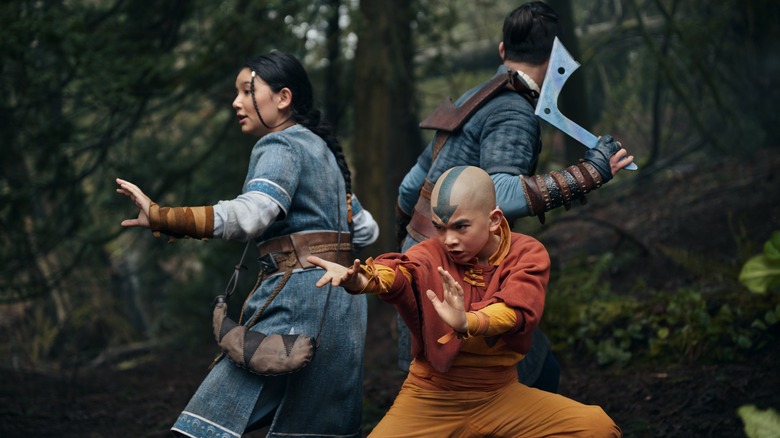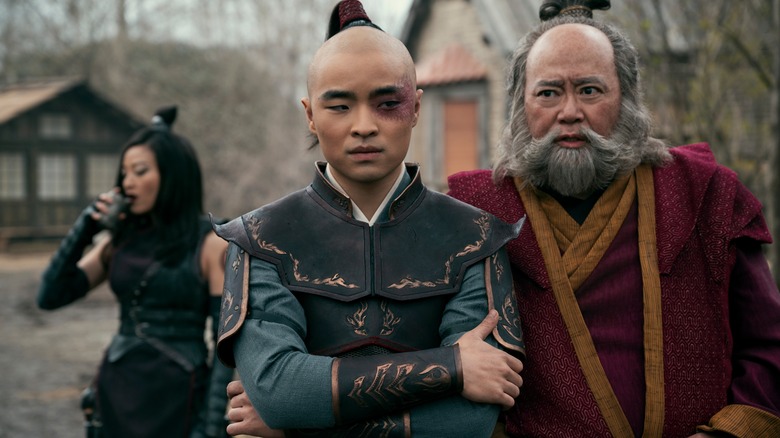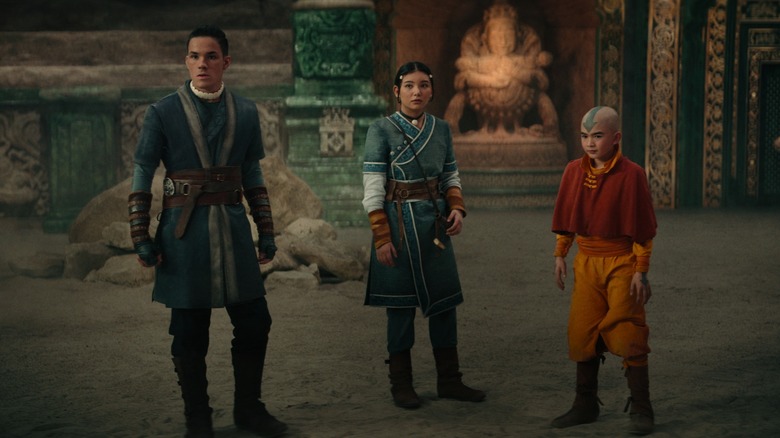Avatar: The Last Airbender Review: A Greatest-Hits Collection Sorely Out Of Its Element
Like the master of all four elements at its center, "Avatar: The Last Airbender" has always had a reputation for being many things at once. Upon its debut almost twenty years ago, the beloved animated series earned instant praise for its handling of surprisingly mature storytelling broken down into its simplest terms for kids. Despite its episodic structure, the individual pieces added up to an even greater whole, rivaling many serialized formats for adults that had already begun popping up with increasing frequency at the time. And in stark contrast to the world-ending stakes and century-long war providing a backdrop to the action, the show never once lost sight of its most important aspect of all: having fun every step of the way.
Now it's Team Avatar's turn in the spotlight once again — or, that is, the Netflix version that has long been in the works and has gone through its fair share of behind-the-scenes chaos. (The much-publicized parting of ways between the streamer and original creators Michael Dante DiMartino and Bryan Konietzko over good ol' fashioned "creative differences" was an early sign of trouble, though the pair still retains partial writing credit on the premiere episode.)
This live-action adaptation arrives at a time when much of the core fanbase are now grown adults and have had a front-row seat to Hollywood's recent trend of dredging up and lightly redressing every recognizable piece of IP they can get their hands on. The creative team, led by writer and executive producer Albert Kim, seems somewhat indebted to the steady stream of live-action Disney remakes that have proved profitable at the box office. Yet, the jury has remained out on whether taking a similar approach to Aang, Katara, Sokka, and their quest to save the four nations would ever really work. After all, how could anyone hope to improve upon perfection or, at the very least, provide a gateway for a new generation of fans ... one that couldn't be achieved by simply throwing on the original show, mind you, which is also currently streaming on Netflix?
Unfortunately, even after watching all eight episodes made available to the press, I struggled to find any solid answer to these most pressing of questions. Despite its obvious good intentions, "Avatar: The Last Airbender" ultimately lets itself down through the most predictable of issues: a medium that doesn't fit the story, a wildly uneven grasp of pacing and tone, and a nagging sense of soullessness where the original's heart and spirit used to reside.
Glimmers of potential
After a freshly reinvented opening sequence that puts the Netflix budget on display for all to see, "Avatar: The Last Airbender" quickly runs through the basic fundamentals. One hundred years of war has engulfed the four nations — neatly split into kingdoms of Water, Earth, Fire, and Air – and the world has largely given up hope on the long-missing prophesied savior known as the Avatar, the one mystical being capable of controlling all four elements through powers known as "bending." Reawakened after a century into an era he hardly recognizes, the reincarnated Avatar Aang (Gordon Cormier) must team up with Water Tribe friends Sokka (Ian Ousley) and waterbender Katara (Kiawen-tiio) on a journey to save the world ... all while outrunning the dangers nipping at their heels, primarily the complicated antagonist Prince Zuko (Dallas Liu) of the oppressive Fire Nation.
Despite their inexperience, our main quartet of young performers is mostly up to the challenge of embodying such fan-favorite heroes and villains (particularly Ousley and Liu, both of whom shoulder some of the most challenging material). It's just a shame that such authentically cast and diverse leads, a much-needed pivot from the largely whitewashed voice cast of the original, must constantly work even harder to overcome issues beyond their control. Viewers will have to put up with plenty of stilted dialogue, awfully lackluster blocking and framing, and a recurring tendency to have characters launch into extended monologues while staring off into the middle distance, unloading their innermost thoughts and feelings aloud with all the subtlety of a fire-blast to the face. Thankfully, however, it was a brilliant choice to surround the child actors with a strong stable of supporting veterans lending gravitas and experience, from Paul Sun-Hyung Lee as Zuko's Uncle Iroh to Danny Pudi as the eccentric Machinist to Utkarsh Ambudkar as mad King Bumi to Ken Leung and Daniel Dae Kim as fearsome Fire Nation figures Commander Zhao and Fire Lord Ozai, respectively.
There are even flashes of creative inspiration found in changes made to certain characters and storylines. Though aspects of Sokka and Katara's personalities and Aang's backstory, in particular, have also been tweaked, only sometimes working as an improvement, none fare better than this show's new take on secondary antagonist Zhao — partly aided by unexpected changes made to the character, but mostly by Leung perfectly threading the needle between camp and menace.
Out of its element
Still, nothing manages to hide the fact that far too much of the property's main appeal gets lost in translation between the animated show and this new one. As it turns out, compressing 20 bite-sized chunks of episodic storytelling into eight serialized installments (running upwards of 45 minutes each, compared to the tight 25-minute episodes of the original) was a losing proposition from the start. When the conventions of modern-day streaming — and, tellingly, the viewing habits that have sprung up as a result — require an approach diametrically opposite to that of the original, is it any surprise that this adaptation only ever comes across like attempts to fit a round peg into a square hole?
The final result is an exercise in cognitive dissonance. Apart from the more bombastic and expensive-looking battle sequences set strategically at night, elemental powers rendered in only occasionally convincing VFX never quite gel with live-action performers who might as well be in completely different, flatly lit environments. The tone oscillates wildly, leaning hard into its darker and more self-serious take on the material in one moment before abruptly switching gears and injecting the cartoonish humor and lighthearted visuals of the original the next. Even the pacing suffers from the Netflixification of "Avatar," simultaneously feeling too rushed and too stretched out. Streamlining entire multi-episode arcs and breezing through significant moments at a rapid-fire clip does Team Avatar no favors (animal sidekicks Appa and Momo get a minimum of focus as a result), while one can almost feel the writers padding out the runtime with extraneous material far more egregious than any so-called "filler" episode from the original. Worst of all, however, the Netflix series doesn't even seem aware of its own target demographic. Far too violent for kids (depicting "realistic" firebending in live action means having to sit through countless innocents gruesomely burned alive, who knew!) but not nearly sophisticated enough to hold the attention of original fans who are now grown up, "The Last Airbender" suffers from an identity crisis even worse than that of Aang.
If nothing else, this entire venture should go a long way toward vindicating fans of traditional television. Writers and showrunners used to break stories with commercial breaks in mind, which had the happy side effect of enforcing a natural three-act structure. In the case of the Nickelodeon original specifically, the animation allowed a freedom of expression, imagination, and tone that could never be replicated in live action. None of that is on display in this stale, streaming-era reimagining of the classic tale, treating viewers to a greatest-hits collection with little of the heart, humor, and soul fans came to expect.
Forget the threat of Zuko or Aang's own self-doubts plaguing every step of his journey: the Avatar's greatest challenge yet turns out to be nothing less than the streaming model itself.
/Film Rating: 4 out of 10
"Avatar: The Last Airbender" premieres February 22, 2024 on Netflix.


